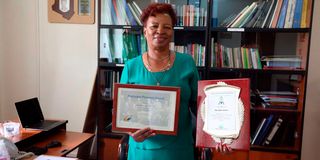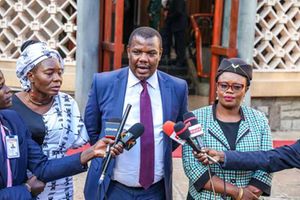Prof Esther Njoki Gicheru : Birth of Co-op University was my greatest coup

Deputy Vice-Chancellor in charge of Finance, Planning and Administration at Cooperative University of Kenya Esther Njoki Gicheru during the interview with ‘Higher Education’ at her office on September 26. Prof Gicheru holds a doctorate in Organisation Development and Transformation.
When Prof Esther Njoki Gicheru completed her Bachelor of Science degree in Agriculture at the University of Nairobi in 1976, she looked forward to pursuing a fulfilling career.
The fresh graduate was over the moon when she landed her first job at the Ministry of Agriculture shortly after her graduation. But there was a challenge. Her work station was Eldoret, something that did not work well for her as she was newly married and taking care of an infant.
She declined the offer. As young Njoki Gicheru pondered her next move, a new door opened. The Public Service Commission announced vacancies at the Ministry of Cooperative Development.
She applied, was hired as a cooperative officer and posted in Nairobi, her dream work town.
The job came as a relief for her young family and marriage. It also marked the start of an illustrious career in the cooperative industry that now spans more than four decades.
Prof Gicheru has risen through the ranks to become the Assistant Commissioner for Co-operative Development in-charge of Rural Credit Department.
Her stint at the ministry headquarters ended in 1988 when she was promoted and posted to the Cooperative College of Kenya as the principal – the first woman to hold the position.
Cooperative College Act
During her tenure, Prof Gicheru oversaw the transformation of the college into a semi-autonomous government agency through the enactment of the Cooperative College Act in 1998.
“The autonomy changed a lot of things at the college. We could do our budget and recruit. Before that, the college was a department in the Ministry of Cooperative Development,” she says.
The stars continued to shine for Prof Gicheru, who holds a doctorate in organisation development and transformation. She named the first director of the college.
She held the position until 2012 when Cooperative College was elevated to a constituent college of Jomo Kenyatta University of Agriculture and Technology (JKUAT).
Prof Gicheru prides herself in being at the forefront of the team that oversaw the transition of the college to a fully-fledged university in her position as acting principal.
In an interview with Higher Education, Prof Gicheru, who is the Deputy Vice-Chancellor in-charge of administration, said her greatest joy has been seeing the institution grow.
From a student population of 800 in 1998, the institution now boasts more than 9,000 learners.
The university teacher has been instrumental in the development of cooperatives in Kenya through implementing massive training programmes for leaders and members of the movement.
She is highly regarded and respected as a co-operative researcher and strategic thinker. Her research work spans cooperative management, cooperative policy, gender issues in cooperatives and incorporation of co-op training in the higher education curriculum.
Her vast experience in the industry saw Prof Gicheru being incorporated in a team that handled the development of the Co-operative University of Kenya first-degree programmes.
She has also served as the director, Institute of Co-operative Development (ICD), which has acted as the custodian of the cooperative tradition for more than half a century.
The birth of the institute in 2014, Prof Gicheru says, was informed by the thinking that the granting of a charter to make the college a full-fledged public university would make its traditional cooperative business fade, given its new broad mandate.
The mission of ICD is to build a cooperative economy through the creation and development of enterprises and network in diverse areas in the industry and the associative economy.
ICD also seeks to fulfil its mandate of being the standard bearer in co-operative education training, research and consultancy.
The university, through the institute, trains cooperative movement leaders and members on governance and management.
“Through action research, we identify cooperative members’ needs and then develop appropriate interventions such as empowering them drive their destiny. We educate them on their rights and responsibilities, especially to understand their role in electing the right leaders and how to hold them accountable,” she says.
The training is meant to ensure prudence management of cooperatives. It targets managers, directors, accountants and other leaders in the industry.
“This examinable course is tailored for the cooperative leadership and is very instrumental in making them learn proper governance and management traits. It also makes them understand the laws and regulations governing cooperatives” she says.
The Tumu Tumu Girls High School alumnus traces her love for the cooperative movement to her formative years while growing up in Theri Village in Murang’a County.
As a girl, she was interested in learning the working of the local coffee cooperative concept. Her father was a member of the cooperative.
Due to her vast experience in the field, Prof Gicheru has been contracted to develop curricula and conduct training on gender integration in cooperatives in Kenya, Uganda, Tanzania, South Sudan, Rwanda, Burundi, Eswatini, South Africa, Lesotho, Botswana, Namibia and Ethiopia.
She is a board member of the International Cooperative Alliance (ICA) where she was nominated to represent women for four years.
According to government data, cooperative societies in Kenya employ more than 500,000 people with another 1.5 million benefiting indirectly.
It also provides opportunities for self-employment to hundreds of thousands of people.
Savings and credit societies (saccos), the fastest growing sub-sector in the movement, have mobilised more than Sh230 billion in savings to date.
There are approximately 25,627 registered co-operative enterprises in Kenya with about 10.93 million members.
Their capital base is about Sh351.3 billion while their turnover is Sh1.08 trillion.
Prof Gicheru enumerates one of her major achievements as overseeing the upgrading of the college into a full-fledged university.
“The transition of the college to a university has always been my joy and greatest achievement. Just knowing that I played a significant role in the advancement of the institution for the betterment of the cooperative movement has been fulfilling,” she says.
The researcher and university teacher has received numerous awards in recognition of her contribution to the cooperative movement in Kenya, Africa and the world.
Prof Gicheru received the Rochadale Pioneers’ Award from the International Cooperative Alliance (ICA) in Geneva, Switzerland, in 2007.
It is the most prestigious award at international level in the cooperative movement. The don was the first African to bag it.
She received the Head of State Commendations (HSC) in 2008. In the same year, the cooperative movement in Kenya recognised Prof Gicheru for distinguished service.
She was awarded the Order of the Grand Warrior (OGW) by President Uhuru Kenyatta in 2016.
Prof Gicheru’s main hobby is travelling in and outside Kenya. She spends time with family members and friends.
The professor’s mother is her role model.
Apart from the BSc in Agriculture, the don has a master’s degree in Cooperative Management from Leicester University in the United Kingdom and doctorate in Organisation Development and Transformation from Cebu Doctors University in the Philippines.
She also holds a diploma in Counselling Psychology from Tangaza University College.





